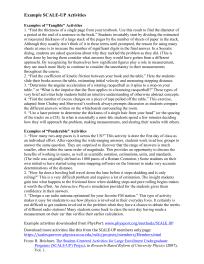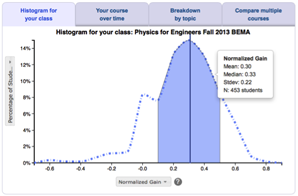





middle schoolhigh schoolintro collegeinter-mediateupper levelgrad school other

calc based

alg based

conceptual






Overview
What? An integrated learning environment where the space is designed to facilitate interactions between small groups working on short, interesting tasks: Hands-on activities, questions, simulations, or laboratories. There is no separate lab class and most of the "lectures" are class-wide discussions.
Why? It leads to improved learning and retention for students of all levels, genders, and races. It creates lasting change in departments. Restructuring the physical space encourages instructors to rethink their teaching. Once they start using SCALE-UP they are unlikely to go back to traditional methods.
Why not? SCALE-UP requires an overhaul of the physical classroom space and the way classes are scheduled. It is difficult for a single instructor to implement SCALE-UP without support from a strong team in their department and institution. Physical infrastructure and instructor training can be expensive.
Classroom video
More about what it looks like…Student skills developed
- Conceptual understanding
- Problem-solving skills
- Lab skills
- Making real-world connections
- Using multiple representations
- Designing experiments
- Metacognition
Instructor effort required
- High
Resources required
- Tables for group work
- Studio classroom
Resources
Everything you need to know about implementing SCALE-UP in your class.
- SCALE-UP at Nottingham Trent University: NTU in the UK has produced extensive resources for implementing SCALE-UP, including a handbook for implementers and handouts for administrators, instructors, and students.
- SERC guide to SCALE-UP
Teaching Materials
Types of SCALE-UP activities with examples:
- Class outline: Because lab/lecture/tutorial sections are integrated, SCALE-UP class periods are typically long (~ 2 hrs), and filled with many short activities. To help students keep track of where they are in the class, the SCALE-UP developers recommend presenting an overview of each day's class on a web page that fits on a single computer screen and can be reviewed later. Example class outline
- Tangibles: These are short activities involving physical experiments using a predict-observe-explain model. Example tangibles
- Ponderables: These are short activities involving conceptual questions that students discuss and answer. Example ponderables
- WebAssign activities: You can use WebAssign or another content management system to assign problems in class that help reinforce concepts introduced in tangibles and ponderables, and helps you quickly assess whether students are understanding the concepts. These are typically short assignments that ask questions directly related to a tangible or ponderable activity the students just did. You can keep students from completing assignments before class by putting a password on the assignment that you give them in class. Example ponderable with follow-up WebAssign activity (unit vectors)
- Labs: In addition to short tangible experiments, students in SCALE-UP classes can also do longer experimental lab work that requires a formal report. Labs allow a focus not just on conceptual understanding but also on hypothesis generation, student design of data collection, and uncertainty considerations Example lab (capacitors)
- Real World Problems: Problems like the University of Minnesota context-rich problems or the University of Maryland thinking problems are good ways to "give students challenging, realistic situations that are best analyzed by working in groups and following a problem-solving protocol" Example real world problems
- 3-way activities: Each group at a table does a different type of activity on the same topic (useful for saving money/space on equipment - you only need one set of equipment for every 9 students, and while some students use equipment that takes up a lot of table space, other students can work on a laptop). Example 3-way activity (fancart)
- Homework: Homework in SCALE-UP should be used to cover the basics that you would normally address in a lecture so that students are fully prepared to participate in group work during class. This can be achieved through assigning reading with reading quizzes and a few straightforward problems before the class on a topic. Homework can also be used to assign more challenging follow-up problems after class. You can reduce grading through online homework systems and/or a "homework lottery" where you roll a die to decide which table's homework you will grade.
Members-only SCALE-UP site:
Contact Robert J. Beichner for more information or to become a member. He will need to verify that you are a legitimate faculty member, so be sure to include a web link or other means of verification in your e-mail.
You can download teaching materials for SCALE-UP classes from NC State from the members-only SCALE-UP site, including:
- Intro mechanics with Matter and Interactions
- Intro E&M with Matter and Interactions
- Modern Physics
- Intro mechanics with traditional content coverage
- Intro E&M with traditional content coverage
Other sources of SCALE-UP teaching materials:
- The University of Iowa has a collection of sample materials for their TILE/SCALE-UP classes in a variety of disciplines.
- The Massachusetts Institute of Technology has complete course materials for two TEAL/SCALE-UP classes: Introductory Physics I: Mechanics and Introductory Physics II: E&M
Find more example SCALE-UP activities in the following journal articles:
- V. Kuo and R. Beichner, "Stars of the Big Dipper: A 3-D vector activity," The Physics Teacher 44 (4), 168-172 (2006). Get the activity described in the article
- M. B. Kustusch, J. D. H. Gaffney, and R. Beichner, "The Real Prize Inside: Learning about science and spectra from cereal boxes," Physics Teacher 47, 450-453 (2009). Get the activity described in the article
- J. D. H. Gaffney, E. Richards, M. B. Kustusch, L. Ding, and R. J. Beichner, "Scaling Up Education Reform," Journal of College Science Teaching 37(5), 48-53 (2008). Get the activity described in the article
Find many more research-based activities that you can use in SCALE-UP classrooms in our Expert Recommendation on finding activities for small group discussions.
Research
This is the second highest level of research validation, corresponding to:
- at least 1 of the "based on" categories
- at least 2 of the "demonstrated to improve" categories
- at least 4 of the "studied using" categories
Research Validation Summary
Based on Research Into:
- theories of how students learn
- student ideas about specific topics
Demonstrated to Improve:
- conceptual understanding
- problem-solving skills
- lab skills
- beliefs and attitudes
- attendance
- retention of students
- success of underrepresented groups
- performance in subsequent classes
Studied using:
- cycle of research and redevelopment
- student interviews
- classroom observations
- analysis of written work
- research at multiple institutions
- research by multiple groups
- peer-reviewed publication
References
- R. Beichner, SCALE-UP Report 1999, 1999.
- R. Beichner, Student-Centered Activities for Large Enrollment University Physics (SCALE-UP), presented at the 1999 Sigma Xi Forum, Minneapolis, MN, 1999.
- R. Beichner, The Student-Centered Activities for Large Enrollment Undergraduate Programs (SCALE-UP) Project, in Research-Based Reform of University Physics, edited by E. Redish and P. Cooney, (American Association of Physics Teachers, College Park, 2007), Vol. 1.
- R. Beichner, The SCALE-UP Project: A Student-Centered Active Learning Environment for Undergraduate Programs, 2008.
- R. Beichner, History and Evolution of Active Learning Spaces, 2014.
- R. Beichner, L. Bernold, E. Burniston, P. Dail, R. Felder, J. Gastineau, M. Gjertsen, and J. Risley, Case study of the physics component of an integrated curriculum, Am. J. Phys. 67 (S1), S16 (1999).
- R. Beichner, J. Gaffney, and M. Kustusch, The Real Prize Inside: Learning About Science and Spectra from Cereal Boxes, Phys. Teach. 47 (10), 450 (2009).
- E. Campos, L. Silva, S. Tecpan, and G. Zavala, Argumentation during active learning strategies in a SCALE-UP environment, presented at the Physics Education Research Conference 2016, Sacramento, CA, 2016.
- J. Chini, J. Gaffney, and A. Al-Rawi, Expectancy Violation in Traditional and Studio-mode Introductory Physics Courses, presented at the Physics Education Research Conference 2013, Portland, OR, 2013.
- G. DeBeck and D. Demaree, Teaching assistant-student interactions in a modified SCALE-UP classroom, presented at the Physics Education Research Conference 2011, Omaha, Nebraska, 2011.
- G. DeBeck, S. Settelmeyer, S. Li, and D. Demaree, TA Beliefs in a SCALE-UP Style Classroom, presented at the Physics Education Research Conference 2010, Portland, Oregon, 2010.
- P. Enderle, S. Southerland, and J. Grooms, Exploring the context of change: Understanding the kinetics of a studio physics implementation effort, Phys. Rev. ST Phys. Educ. Res. 9 (1), 010114 (2013).
- K. Foote, A. Knaub, C. Henderson, M. Dancy, and R. Beichner, Enabling and challenging factors in institutional reform: The case of SCALE-UP, Phys. Rev. Phys. Educ. Res. 12 (1), 0101031 (2016).
- K. Foote, X. Neumeyer, C. Henderson, M. Dancy, and R. Beichner, Diffusion of research-based instructional strategies: the case of SCALE-UP, Int. J. Sci. Educ. 1 (1), 1 (2014).
- K. Foote, X. Neumeyer, C. Henderson, M. Dancy, and R. Beichner, SCALE-UP Implementation and Intra-Institutional Dissemination: A Case Study of Two Institutions, presented at the Physics Education Research Conference 2014, Minneapolis, MN, 2014.
- J. Gaffney, A. Gaffney, and R. Beichner, Do they see it coming? Using expectancy violation to gauge the success of pedagogical reforms, Phys. Rev. ST Phys. Educ. Res. 6 (1), 010102 (2010).
- J. Gaffney, A. Gaffney, and J. Chini, Using Expectancy Violation To Investigate Student Dissatisfaction In Studio Physics, presented at the Physics Education Research Conference 2013, Portland, OR, 2013.
- J. Gaffney, E. Richards, M. Kustusch, L. Ding, and R. Beichner, Scaling up education reform, J. Coll. Sci. Teaching 37 (5), 48 (2008).
- C. Hoellwarth, M. Moelter, and R. Knight, A direct comparison of conceptual learning and problem solving ability in traditional and studio style classrooms, Am. J. Phys. 73 (5), 459 (2005).
- A. Knaub, K. Foote, C. Henderson, M. Dancy, and R. Beichner, Get a room: the role of classroom space in sustained implementation of studio style instruction, Int. J. Sci. Math. Educ. 3 (1), 1 (2016).
- V. Kuo and R. Beichner, Stars of the Big Dipper: A 3-D Vector Activity, Phys. Teach. 44 (3), 168 (2006).
- N. Lasry, E. Charles, C. Whittaker, H. Dedic, and S. Rosenfield, Changing classroom designs: Easy; Changing instructors' pedagogies: Not so easy..., presented at the Physics Education Research Conference 2012, Philadelphia, PA, 2012.
- X. Neumeyer, K. Foote, R. Beichner, M. Dancy, and C. Henderson, Examining the diffusion of research-based instructional strategies using social network analysis: A case study of SCALE-UP, presented at the 121st ASEE Annual Conference and Exposition, Indianapolis, IN, 2014.
- E. Sandt and A. Traxler, Non-traditional students' conceptual scores and network centrality in SCALE-UP classrooms, presented at the Physics Education Research Conference 2016, Sacramento, CA, 2016.
- J. Saul and R. Beichner, An Activity-based Curriculum for Large Introductory Physics Classes: The SCALE-UP Project, presented at the Physics Education Research Conference 2001, Rochester, New York, 2001.
- C. Wenning, Whiteboarding & Socratic dialogues: Questions & answers, J. Phys. Teach. Online 3 (1), (2005).
- B. Zamarripa Roman, C. Doty, M. Wilcox, N. Klinger, J. Pond, J. Von Korff, and J. Chini, Differences between the SCALE-UP model and instructors' perceptions of implementation, presented at the Physics Education Research Conference 2017, Cincinnati, OH, 2017.
- E. Zipperer, N. Weliweriya, T. Cotten, M. Dassanayake, and A. Karunaratne, Online teaching-learning in STEM SCALE-UP classrooms during the COVID-19 pandemic: feedback from students, presented at the Physics Education Research Conference 2021, Virtual Conference, 2021.








